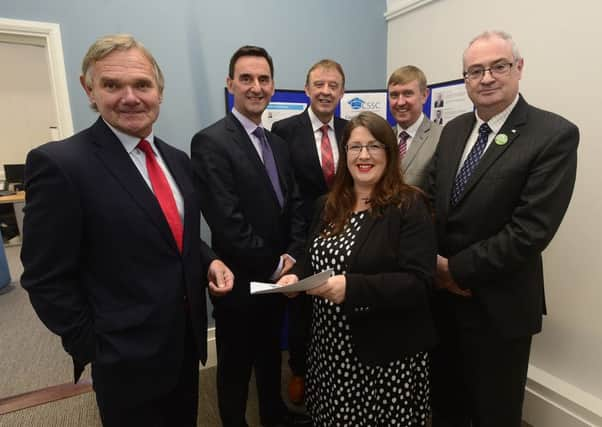Only two-thirds of controlled pupils are Protestant '“ and figure is falling


What is more, the proportion of Protestants in Catholic-controlled schools is tiny by comparison, amounting to only one in a hundred pupils.
These are among the facts and figures cited by the Controlled Schools’ Support Council this week, ahead of an event yesterday marking its first year in existence.
Advertisement
Hide AdAdvertisement
Hide AdThe council (known by the acronym CSSC) is a body representing the interests of controlled schools, and is akin to the Council for Catholic Maintained Schools or the Council for Integrated Education Northern Ireland.
It was formally brought into being thanks to the 2014 Education Act, and first got up-and-running on September 1 last year.
A networking-and-information event yesterday to herald the anniversary, held at its Stranmillis University College headquarters in south Belfast, was attended by politicians from both main unionist parties and others, and saw addresses by its chairman Mark Orr and chief executive Barry Mulholland.
In the run-up to the event, the CSSC had produced a report breaking down all the key statistics from the sector.
Advertisement
Hide AdAdvertisement
Hide AdAmong the figures which were delved into by the News Letter, is the religious breakdown of controlled schools.
Controlled schools are run by boards of governors with strong input from Protestant churches, and the CSSC itself has said that “many people equate the controlled sector with the ‘Protestant sector’”.
However, figures circulated by CSSC ahead of yesterday’s event described the breakdown as follows.
It said that 66.2% of pupils in controlled schools were classed as Protestant; 9.6% Catholic; 5.3% other Christian; 0.9% non-Christian; and 18.1% as no religion or undisclosed.
Advertisement
Hide AdAdvertisement
Hide AdBy contrast, it said Catholic maintained schools have 95.7% of pupils classed as Catholic; 1% Protestant; 0.5% other Christian; 0.2% non-Christian; and 2.6% no religion or undisclosed.
Further figures show that there has been a steady drop in the number of pupils “from Protestant families” in controlled schools – going from 78.1% in 2014/15 down to the figure of 62.2% in 2016/17.
The figures cover all pupils at primary and post-primary schools, and are compiled as part of the Department of Education’s annual schools survey.
Though the department has officially monitored and recorded school data for years, it is thought that the CSSC’s recent move to compile all the data on religious demographics into a report may be the first time the information has been widely publicised to a general audience.
Advertisement
Hide AdAdvertisement
Hide AdAmong those attending the event yesterday was Mervyn Storey, DUP MLA and ex-finance minister.
He said the creation of CSSC “helped to address a longstanding deficit in representation for schools”, putting the controlled sector on a similar footing with the Catholic and integrated sectors.
“The establishment of such a body was something argued for by the DUP over many years and it ensures greater equality and fairness across the education system,” he said.
“The body has already engaged in a lot of positive work and I have no doubt will play a role in helping raise education standards across the sector.”